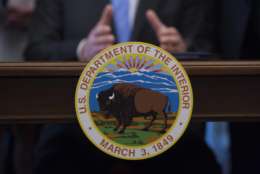Workforce Rights/Governance
-
The Office of Compliance's executive director tells Federal Drive with Tom Temin what's been going on since she joined earlier this year.
September 27, 2017 -
The Veterans Affairs Department fires its D.C. medical center director, Brian Hawkins. This is the second time the department has attempted to fire Hawkins for "ineffective leadership."
September 20, 2017 -
Social Security, the Veterans Affairs Department and the Office of Personnel Management have one thing in common: a big backlog of applications for what they provide. OPM's National Background Investigative Bureau has a backlog of 700,000. Trey Hodgkins, senior vice president of the Information Technology Industry Council, says this is becoming a national security concern and Congress isn't doing enough to cut it down.
September 15, 2017 -
AFGE and NFFE say they have not had a substantive seat at the table during the drafting of HUD’s reform plans.
September 11, 2017 -
Without action from the president, the National Council on Federal Labor-Management Relations will expire at the end of the month.
September 01, 2017 -
The Pentagon's new Cyber Excepted Service will extend the probationary period for new employees to three years and give hiring managers more flexibility to recruit candidates.
August 30, 2017 -
A group of lawyers is encouraging the Office of Special Counsel to take special notice of the senior executive reassignments at the Interior Department, out of fear they could have dangerous implications for the future of the civil service.
August 25, 2017 -
The Veterans Affairs Department's push to more easily fire employees charged with misconduct has found its latest target — the former director of the Washington, D.C. VA medical center.
August 02, 2017 -
FEMA has a limited view into the allegations of misconduct that come from the agency's employees, because it lacks both the case management system and the written disciplinary policies to address misconduct from its cohort of temporary workers.
August 01, 2017 -
As members of Congress encourage the whistleblower community to continue to speak up, they acknowledged the long list of improvements they want to make to whistleblower protections at individual agencies like the IRS and FBI.
July 27, 2017 -
The Republican Study Committee released its own take on the fiscal 2018 budget, which includes several cuts to federal pay, retirement and health benefits. Here's how the committee's budget proposal measures up to other recommendations from the Trump administration and other House lawmakers.
July 26, 2017 -
Rep. Todd Rokita (R-Ind.) reintroduced the Promote Accountability and Government Efficiency (PAGE) Act after a similar bill died in the previous Congress. The legislation would give agencies the authority to remove or suspend new employees "without notice or right to appeal, from service by the head of the agency at which such employee is employed for good cause, bad cause or no cause at all."
July 24, 2017 -
Does the government fire enough people? Does it deal effectively with poor performers? Is the disciplinary and adverse action process effective? The answer to all three questions is probably no.
July 18, 2017 -
Defense Secretary Mattis is reviewing the chief innovation officer position after his predecessor moved full speed ahead on it.
July 17, 2017 -
According to the Veterans Affairs Department's new reports detailing all major disciplinary actions for its workers, VA is on track to fire fewer people in 2017 than it has during the past six fiscal years. Federal employment experts say the new adverse action reports lack some significant details about VA's efforts to improve accountability and transparency.
July 10, 2017















